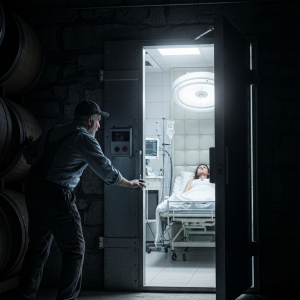My sister, Megan, and I have always had an okay-at-best relationship. We never shared clothes, never talked about boys. Whenever it was just us two, the air was filled with an awkward silence that neither of us cared enough to break. But that all changed when she turned 21. The second she took her first sip of beer, everything changed. She went from drinking monthly, to weekly, to daily. What was even worse was when she tried to drag me down with her. On her 22nd birthday, she gave me a bottle of water that was actually straight vodka. When I spat it out, coughing, I looked up to see her recording my reaction and laughing. I gave her one final chance after that. I told her if she tried to drag me into drinking again, I would cut her off. A month later, at her and her boyfriend’s anniversary dinner, she kept giving me extremely diluted drinks that I didn’t even realize had alcohol in them. When I felt the world start to spin and confronted her, she admitted what she had done, laughing. I called a cab on the spot and told her I never wanted to see her again.
Life went on without her. I soon met the love of my life, David. We got engaged, got married. My sister wasn’t invited. But then, coincidentally, when I was pregnant, she sent me a message. Seeing my Facebook post about having a baby made her realize “nothing is more important than family.” She apologized and begged for another chance. I was very reluctant, but eventually agreed. We met for coffee. She was nice and apologetic, but she still had three glasses of wine, letting me know she was still drinking regularly. She promised she’d respect my boundaries.
For a year, everything actually went fine. But then last week, she came over to my house, and I realized resuming contact with her was the worst thing I could have done. This was the first time I’d let her come over after my baby’s birth. I had warned her that she wasn’t allowed to go near the baby if she’d been drinking. She told me that was no problem. I still had a bad gut feeling, but the last year gave me reason to trust her, so I pushed my worries away.
She came over with two bottles of wine. We all had a pleasant chat, and even my husband had a glass. My sister almost finished the two entire bottles herself and was quite intoxicated. Still, the evening was going okay until she asked to use the bathroom. After a few minutes, I went to check on her. But when I went up, she wasn’t in the bathroom. She was in our room, sitting on our bed, holding my baby.
The second she saw me, she panicked and quickly stood up to give him to me. But as she was standing up, she lost her balance. She fell and dropped my baby. He fell on the floor. I screamed and went to check on him. Thankfully, he hadn’t fallen from a notable height. He was crying but seemed to have no major injuries. My sister got up and started apologizing, and I just called my husband. I told him to hold our baby and dragged my sister downstairs. I told her I had one rule, and she had broken it. I called her a taxi home, saying I never wanted to speak to her again.
That, however, turned out to be a mistake. As it turned out, she had done more than just drop my baby. She had fed him the remainder of her wine bottle. He was currently upstairs throwing up while my husband was crying and calling the hospital.
The next few hours were a blur of panic. The ambulance took us to the emergency room, where doctors confirmed alcohol poisoning in my infant son, Jackson. They ran tests while David and I paced the waiting room, terrified. The hospital social worker interviewed us, looking suspicious when we explained what had happened. They started a mandatory child welfare investigation, making us feel like criminals. I tried calling Megan repeatedly, but she wouldn’t answer. She had simply vanished.
After an agonizing night, the doctors told us Jackson would be okay, though we’d need to monitor him closely. The relief nearly buckled my knees. When we brought him home the next day, I was filled with equal parts relief and rage. That afternoon, I drove to Megan’s apartment. Her boyfriend, Thomas, answered, looking hung over. He claimed Megan wasn’t there. I showed him photos of Jackson in the hospital and explained what happened. The color drained from his face. “She’s been getting worse,” he admitted. “Drinking more than ever.” Before leaving, I made it crystal clear: If either of them came near my family again, I’d have them arrested.
Back home, David and I agreed: My sister was permanently cut from our lives. We blocked her number, social media, and email, and installed a security camera at our front door.
For a week, we focused on Jackson. We were just starting to breathe easier when my phone exploded with messages from relatives. Megan had posted a tearful, intoxicated video online claiming I was keeping her from her nephew out of spite. She described herself as a loving aunt who made “one tiny mistake” and was now being cruelly punished. The video prompted a flood of family members to contact me, demanding to know why I was being so harsh. Several relatives were now convinced I was overreacting. Their willingness to believe her without even hearing my side was deeply painful.
Yesterday, we received a formal-looking letter from Megan claiming she’d entered rehab and her therapist recommended family healing. David suggested we verify this. I called the facility she named. It didn’t exist.
I’m sitting here now, looking at my beautiful baby boy sleeping in his crib, wondering how my own sister could first endanger his life and then lie so blatantly. David wants to get a restraining order, but some family members are already calling us heartless. I never imagined becoming a mother would mean defending my child from my own sister.
The next day, I called Jordan, a friend who worked as a detective. “Getting a restraining order isn’t impossible,” he said, “but judges typically need more than one incident to establish a pattern of behavior. Document everything.”
That night, our front door camera sent an alert. I checked the footage. It was Megan, stumbling up our walkway at 11:30 p.m., clearly intoxicated, holding a bouquet of flowers and a teddy bear. She rang the doorbell repeatedly, then sat on our porch for nearly twenty minutes before leaving the items with a note: “I’m so sorry for the misunderstanding. Please let me see my nephew. He needs his auntie. Love, Meg.” I added the incident to our documentation file.
The next morning, I called our pediatrician to warn them that Megan might try to access Jackson’s medical records. Later that day, their office called. Someone claiming to be my sister had requested copies of Jackson’s records, saying she was helping me gather documentation for a specialist. When they asked for the authorization form, she hung up.
The following day, David and I visited a daycare we’d planned to enroll Jackson in. The manager, Karma, looked concerned. “Actually,” she said hesitantly, “someone matching your sister’s description was here yesterday, asking about enrollment procedures.” The realization that Megan was tracking our movements so closely made me physically ill.
That weekend, my mother called, inviting us to Sunday dinner. “We promise Megan won’t be there,” she said. Cautiously, we agreed. We arrived at my parents’ house, and everything seemed normal. Then I heard it: the unmistakable sound of my sister’s laugh coming from the kitchen.
I didn’t say a word. I simply picked up Jackson, grabbed the diaper bag, and walked straight to the door. I heard David behind me saying something about trust being broken, but I was already strapping Jackson into his car seat, my hands shaking with anger and betrayal. When he returned an hour later, his expression was grim. “They admitted they set it all up,” he said. “They thought if they could just get us all in the same room, we’d talk it out.” He paused. “And you’re not going to like this. Megan’s been living with them for the past three weeks. Thomas kicked her out after learning what she did.”
I cried that night for the family I thought I had. The next morning, I sent a simple text to my parents: “We need space from all of you right now. Please respect that.” Then I blocked their numbers.
On Thursday, I ventured out to the grocery store with Jackson. I was in the produce section when I felt that unmistakable sensation of being watched. I turned to see Megan at the end of the aisle, pretending to examine oranges. My heart raced. This couldn’t be a coincidence. I abandoned my cart and headed for the exit. Once home, I had a full-blown panic attack. “We need legal help,” David said once I’d calmed down. “This is stalking.”
The next day, we consulted with Jordan again, who agreed we needed to pursue a restraining order more aggressively. Over the next week, Megan escalated. She created new email addresses, sent daily messages, and left voicemails alternating between pleading and demanding.
Two weeks after the grocery store incident, our newly hired nanny reported that the same car had circled the block three times during her walk with Jackson. The next day, a mutual friend, Dakota, called. Megan had been asking her weird questions: what time I usually put the baby down for naps, if I still kept a spare key under the planter. I immediately called a locksmith.
That night, around 2 a.m., David nudged me awake. “There’s a car parked across the street,” he whispered. “It’s been there for at least an hour.” It was her. David went out. When he told her he was calling the police, she took off.
The next morning, we took this new evidence to Jordan, who agreed we finally had enough for a temporary restraining order. It was granted within hours. For about a week, it seemed to work. Then, I discovered something horrifying. While checking Instagram, I stumbled across a “mommy blog” account using photos of Jackson. It was called “Auntie Meg’s Adventures” and featured dozens of my photos of Jackson with captions like, “My precious nephew growing so fast.” One even included a fabricated story about a babysitting adventure that never happened.
The stress was taking a toll. We started therapy with a Dr. William, who specialized in family trauma. Halfway through our first session, David’s phone rang. It was our neighbor. “We need to go,” he said, his face pale. “Someone broke into our house.”
We rushed home. The police had already cleared the house. Nothing was missing, but when we reached Jackson’s nursery, I stopped dead. On the changing table sat a large gift basket. Inside were baby clothes, toys, and a card. As David carefully unwrapped it, we discovered all the clothes were soaked in red wine. The card read: “Since you won’t let me see him, I thought I’d send something for him to remember me by. Blood is thicker than water, but wine leaves a stronger stain.”
The violation of our home, specifically our baby’s room, left me feeling terrified. “We can’t stay here,” I finally said.
We drove to David’s parents’ house in Lakeside, a quiet, gated community. On the fourth day, my phone chimed with a text from an unknown number: “Nice place. The garden looks peaceful.” She had found us again.
Michael, David’s father, was a retired security specialist. He helped us secure the house further. Meanwhile, the court date for our permanent restraining order was approaching. In court, I presented our case as calmly as I could. Then Megan’s lawyer stood up. He portrayed her as a struggling alcoholic who had made “one terrible mistake” and was being unfairly punished. “My client has enrolled in rehabilitation, Your Honor,” he said smoothly.
The judge took a 30-day continuance to review all evidence. As we walked to our car, I spotted my mother. “Megan’s been having difficult thoughts,” my mother said. “She says being cut off from family is killing her. Can’t you drop this?”
“Mom,” I said, “she gave alcohol to my infant son. She broke into our house. She’s stalking us. And you want me to forgive and forget?” My own mother had compromised our safety by telling her where we were. “We’re done here,” I said quietly.
The night before our rescheduled court date, our security system triggered an alert. The cameras captured Megan attempting to enter the backyard by scaling the fence. In court the next morning, the judge reviewed the new evidence. He granted the permanent restraining order immediately, for a period of three years. Within hours, Megan violated it by sending an email: “No piece of paper will keep me from what’s mine.” Officers went to her last known address, but she had vacated. What they found there was disturbing: empty liquor bottles and a wall covered with printed photos of Jackson, some clearly taken from a distance, along with maps of our routines.
Three tense days passed. On the fourth day, our nanny took Jackson to the community park. Her voice was tight with panic when she called. “I think I just saw your sister.”
I called David, who ran out the door, then I dialed 911. Five minutes later, David called back. “We’ve got Jackson. Jessica definitely saw Megan. She tried to run when I showed up, but the security guard stopped her at the gate. Police are taking her into custody now.”
I collapsed onto the couch in relief. For the first time in weeks, I allowed myself to believe we might actually be safe. She got bail, but with conditions: an ankle monitor and weekly testing. Two weeks later, a full substance abuse evaluation revealed more than just alcoholism; the psychologist found concerning personality disorder traits. The court ordered her into dual treatment.
About a month into her court-mandated treatment, we received a letter from her therapist, requesting a supervised family session. We declined. Around this time, my parents made another attempt at reconciliation. “We understand now,” my father said, “that we’ve been enabling her behavior for years.” For the first time, I think they really did.
Six months passed with relative calm. Then, a formally worded letter arrived via her therapist. In it, Megan acknowledged her actions without excuses. She expressed remorse. She didn’t ask for forgiveness, just acknowledged the harm she had caused.
By the two-year mark of Megan’s recovery, we had established a cautious, distant relationship. She attended occasional family gatherings where Jackson was present, but under strict conditions: she remained completely sober and was never alone with him. She accepted these limitations without complaint.
Meanwhile, I continued my own therapy. I still struggled with anxiety, but Dr. William assured me these reactions were normal.
When Jackson turned four, we held a small birthday party. Megan was there. She brought a modest gift, a picture book about dinosaurs, which she first showed to me for approval. During the party, I noticed her sitting alone on a bench. I went to join her. “Today marks three years sober for me,” she said. “I just wanted to thank you.”
“Thank me for what?”
“For maintaining your boundaries. If you had given in when I was manipulating everyone, I probably wouldn’t have gotten the help I needed. Your refusal to accept my behavior forced me to actually confront my issues.”
I didn’t know what to say. As I walked back to the party, I realized we had found a new equilibrium. Not the close sisterhood I might have dreamed of, but a carefully managed relationship built on hard-earned respect.
Last week, Megan celebrated four years of sobriety. She moved to a neighboring town for a job in addiction counseling. She maintains appropriate boundaries, always checking before sending gifts. Sometimes I watch her interact with Jackson, and I feel a complex mix of emotions: lingering weariness, sadness for what might have been, but also a measured appreciation for the work she’s done to change.
I’ve come to accept that some wounds never fully heal. I doubt I’ll ever completely relax when Megan is around Jackson. But the acute fear has subsided, replaced by a vigilant caution that feels manageable. The best revenge against trauma is to not let it control your life forever. We’re moving forward, cautiously but deliberately. That’s not a fairy-tale ending, but it’s a real one. And in the messy,reality is all we have to work with.




